Kevin Hart Invested Serious Money Into Black Sands Entertainment, And We Spoke With The Black Entrepreneurs Who Got Him To Bite On "Shark Tank"
- Oops!Something went wrong.Please try again later.
Growing up Black, especially in the '90s, meant very little superhero representation.
Disney / Via media.giphy.com
Of course, there was Black Panther, Falcon, Cyborg, Static Shock, Storm, and a handful of other notables, but they always felt like Black characters in a supremely white environment. Even Black Panther spent so much time with the Avengers or out on other missions that we rarely got to see the fabled Black beauty of Wakanda until much later in his comic history.
Black Sands Entertainment is working to make sure the children of the future have real, prevalent, and sprawling visions of what Black heroes can and should be.
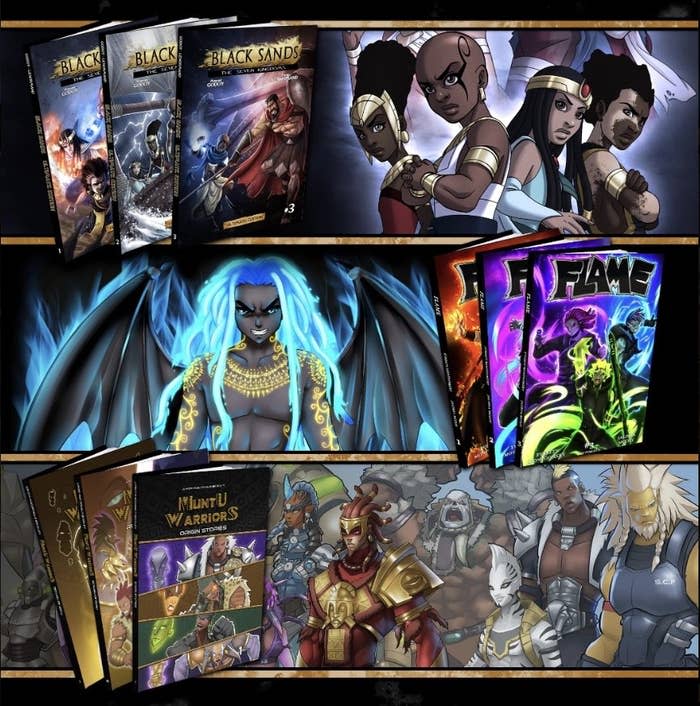
Manuel and Geiszel Godoy, the creators and visionaries behind Black Sands Entertainment, made a slew of powerful and historically rich Black characters for their comic book and entertainment company.

The power couple has since partnered with Mark Cuban and Kevin Hart after appearing on Shark Tank.
I was blessed with the opportunity to speak with Manuel and Geiszel about their company, Black power and ownership, technology, and how to move as a Black business owner in this economy.
1.Nice to meet you two! I was curious how you came up with the name Black Sands Entertainment?
Manuel Godoy: "The name Black Sands is actually a literal translation of the original name of Egypt, which is Kemet. Since the literal translation was black sands, I thought it would be clever to name my series Black Sands, since it's a story about Egypt."
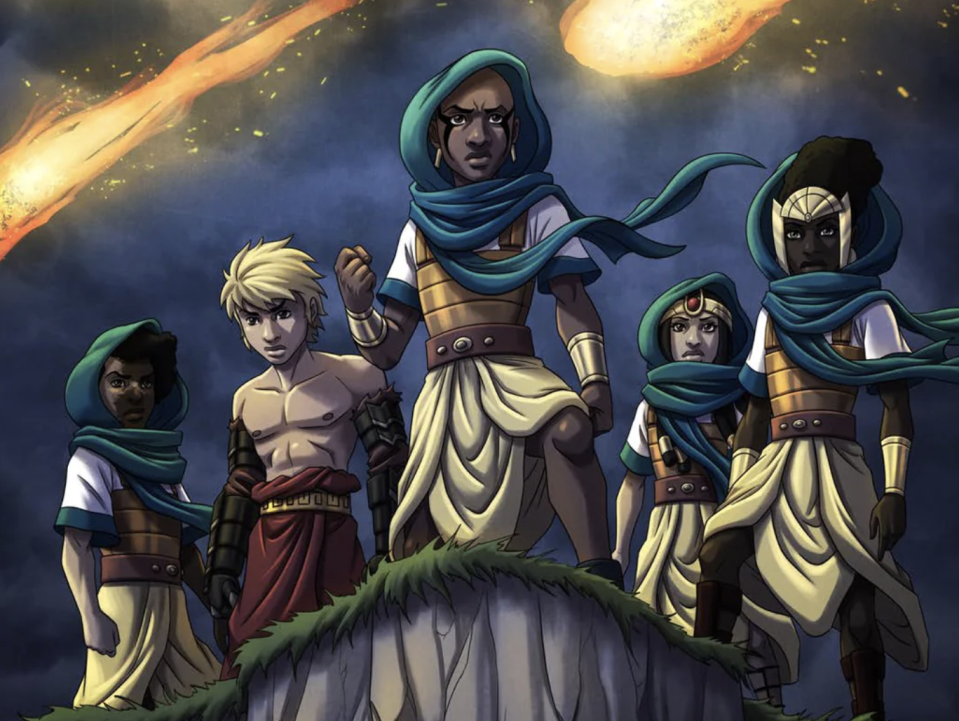
2.I like that. So what were some of your influences growing up that led both of you down this path?
Geiszel Godoy: "By nature, I'm a business-savvy person. I have military background experience, I led soldiers in the military to do their job correctly. So I was always good at leading and leading the team successfully. So I think that's my background as far as the company goes."
MG: "I played a ridiculous amount of RPGs, read comics, and most definitely watched a lot of anime. So I used to watch YuYu Hakusho, Dragon Ball, all them joints. There were so many things that I watched, and seeing it gave me an idea of, like, one day if I had the opportunity, I'll be able to make my own story. And with constant releases of Egyptian stories that were significantly whitewashed, eventually, I was like, 'You know what, I'm gonna try my own and see if people like my version of the story of North Africa.'"

3.Why do you believe this path or these stories are necessary for Black youth?
GG: "So they can see themselves represented positively. It's very well much needed: positive representation so they could feel good in their own skin and know that they came from a culturally rich background. You know, it's just not about slaves and Black struggle. We do have a history where we were kings and queens. And we think all of the Black youth need to know this."
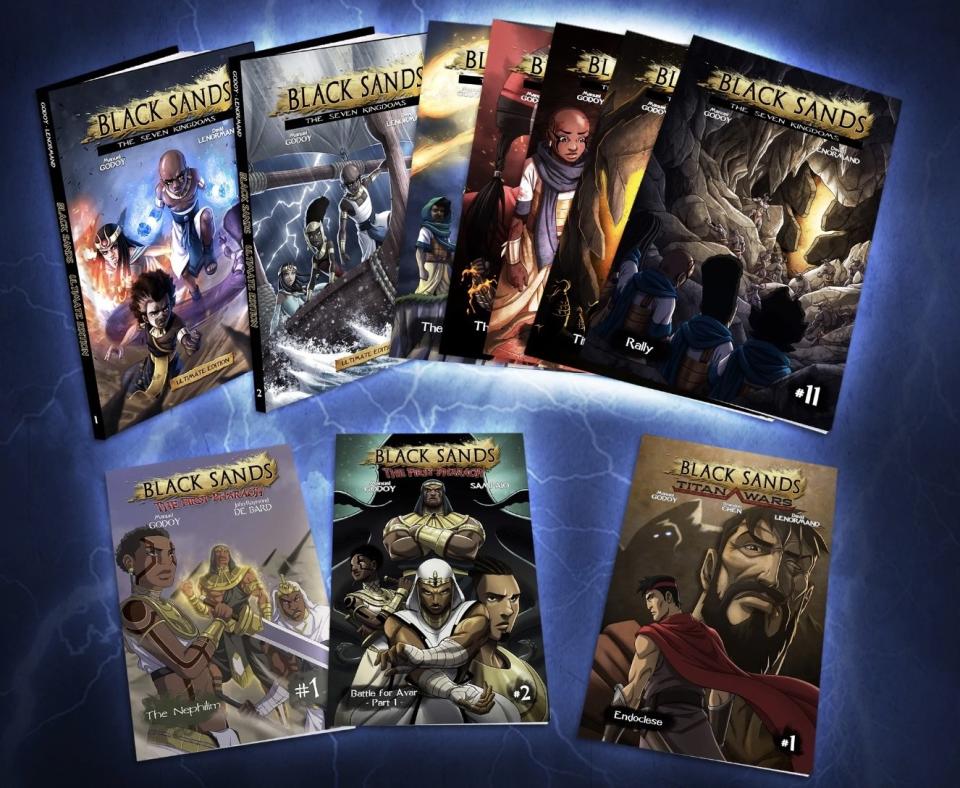
MG: "I always say 'What's good for the goose is good for the gander,' right? We learned a lot about European achievements nonstop, every five seconds during school. And there's a reason behind that, because that little orphan white kid, right? He might need some more motivation as to what he wants to aspire to be in the future. So you can always look at Julius Caesar, the fact that he basically was dead broke, his family lost everything they had, and he had to come up through the military and become the man that he is; that's a great inspiring story for almost every single white person out there. To be like, 'Hey, no matter what background you come from, you can make something of yourself.' We need that kind of story for ourselves as well."
4.That's amazing. Do your characters only draw from Egyptian inspiration, or from other African gods and cultures as well?
MG: "Yeah, it really depends on which storyline. Black Sands, specifically, it will be the Kushites and Kemet, so those two nations are the ones that have the most characters in there. But we also got series like Mask of the Orisha, which is all based on Western African cultures. We have Muntu Warriors, which has a lot of South African and East African deities, and also just cultural references. We have Madagascar, which is a historical drama, about Queen Ramavo. And that one is not even fantasy elements at all. It's just straight-up how Queen Ramavo came to reign."
5.I know this is a hot topic right now, but do you use AI generation in your illustrations at all? Or is it all human-created?
MG: "Well, I'm a big avoider of all trends. I was the guy screaming at the top of the hill saying, 'Don't invest in them coins' to all my followers, and they just did it anyway, some of them did it and got robbed. People were like, 'I beg you, go do NFTs, your characters are so amazing, man.' Now that's completely bellied out. Now we're going to have the AI wave, which is just filters, I don't care what anyone says, it's just filters. But you know, maybe some of them will be successful. But the bottom line is, they can't tell a story. And more importantly, they can't build a fan base."

6.What advice would you give Black creators trying to break through into the comic space?
GG: "I would say follow someone that you know, who has been successful in this space. Follow the lead, follow what they did, how they got started. Because I have a lot of people that I know jump into the space and they fail, because they weren't business savvy. They were very good at creating stuff. But as far as business savvy, they had no business. So follow someone that was successful."
MG: "There are three steps that I feel are the embodiment of the independence struggle. The first one is to finish your book. A lot of people, like 95%, won't finish the actual book they're inspired on. They'll make like three, four, or five different books, they'll have a whole bunch of samples never actually finished. So that's the first one. The second one is, sell 1,000 copies. It's not hard to do a couple of shows, right? Do a couple of comic conventions, or whatever, and you should eventually be able to get to 1,000 copies. So by doing that, you'll learn what works, what doesn't work, how your competitors are competing, and you'll be able to see what they're doing, whether it's better or worse, you'll be able to make adjustments to get better at actually selling. And after you get to that 1,000, it's about scaling at that point."

7.What is your personal favorite comic in your Black Sands collection? And why?
GG: "I would say Ineola, of course, because that's one of the comics me and my husband wrote together. She's very strong, she's independent. It's not a story about a superhero. You know, people always make stories about superheroes. It's a story about an independent strong Black woman who takes crap from no one."
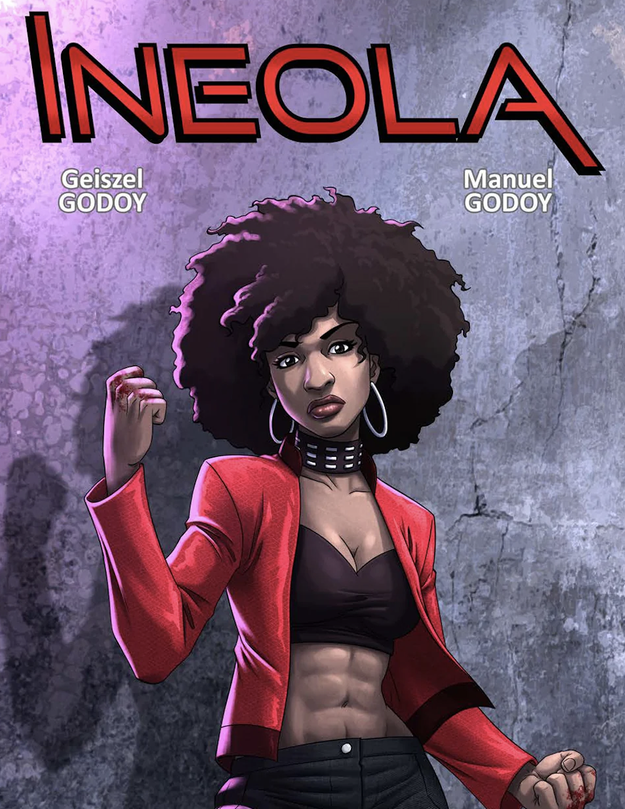
MG: "I think Madagascar is probably one of my favorites. Because it's so historically significant. Queen Ramavo was probably one of the most hated people by colonial powers — like, they hated her! Because she basically messed up their entire power, the system they had in place in Madagascar. They wanted to basically exploit them to death. And she was like, 'Ya'll gotta leave.' And she used a lot of military force to do so, she wasn't one of those, 'I'm gonna go and ask you to leave' [laughs]. And they demonize her, call her the Mad Queen, and all this other stuff. This story goes into the humanization of the character."

8.What was it like working with or interacting with Kevin Hart and getting everything off the ground on that superstar level?
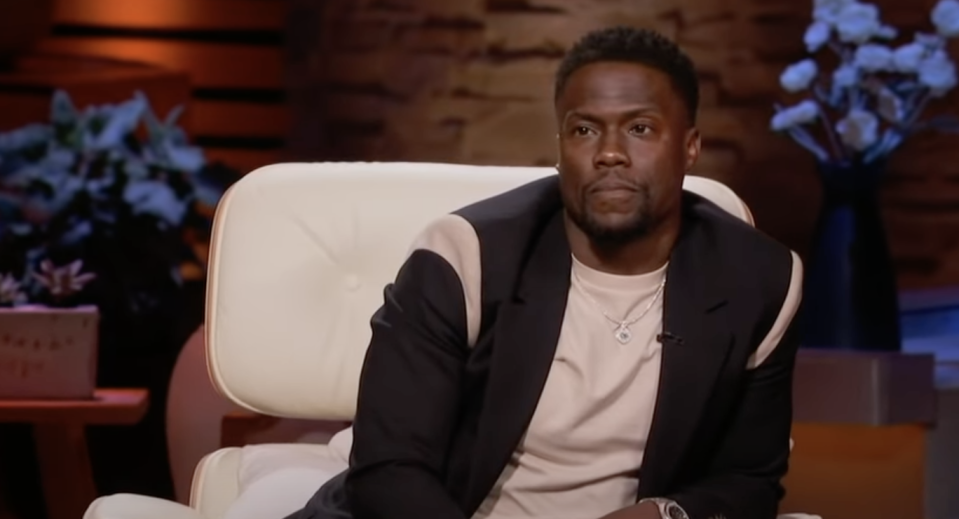
MG: "He's still on tour. He's been touring for a while. And so, there's a lot of things that we have planned. They haven't really happened yet. So we're still waiting for those opportunities to arise. He only tours once every like six years or something like that. So he's been running around the entire country and everything else. So, we're still waiting for those opportunities to happen, but when they do, it'll happen pretty quickly."
9.And lastly, what is the most important lesson that you want people to walk away with after reading your comics?
GG: "They can do what we do! They can become entrepreneurs. You know, we had no experience in the publishing industry or writing comics, but this is something that we learned. Actually, I learned from him, because he picks up things pretty quickly. So he learned pretty quickly and I was like, 'Okay, I want to learn too.' So we are just normal people who learned how to do publishing and run a publishing house. And people that are reading our books, we want them to know that they can do the same thing: become successful Black entrepreneurs, just like us."
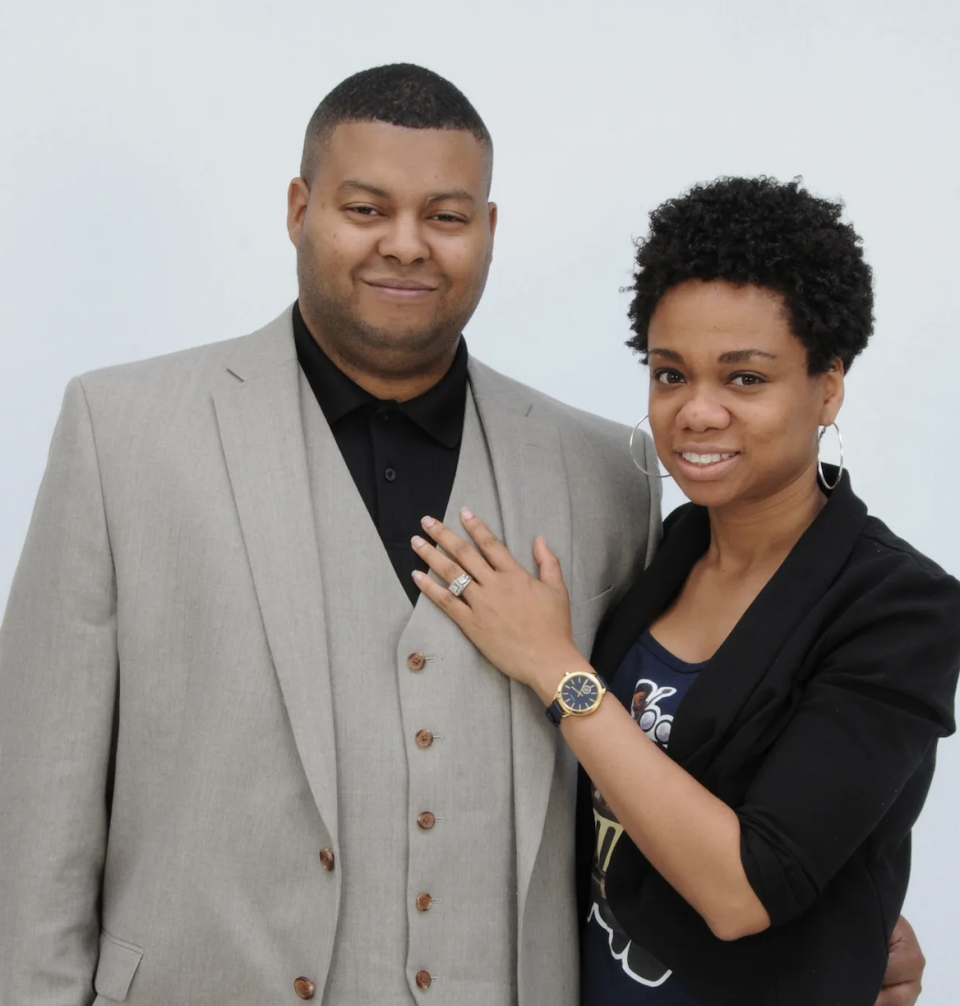
MG: "I 100% believe that ownership is king. And I've dealt with a lot of people in the past who try to take ownership from me and give me hopes and dreams. And so one thing I will say is, when they read the story, I want them to feel like they have more cultural stuff to look back on. Something they can connect to in a further space. I have 5,000 Black investors. So I'm deep in my own community, and not relying on other factors in order to be successful. And the fact that I am the most successful in this space, that is the reason why they should feel like they can rely on their own people. That they don't have to change their story. They don't have to make it less Black or less representative in order to appease the big decision-makers. I might never make hundreds of millions of dollars in the future. But I am a millionaire, so I don't care. At the end of the day, I'm comfortable where I'm at, right? I'm very successful. And I'll probably be able to do this for the rest of my life, and build, and build, and build, and give other people opportunities."
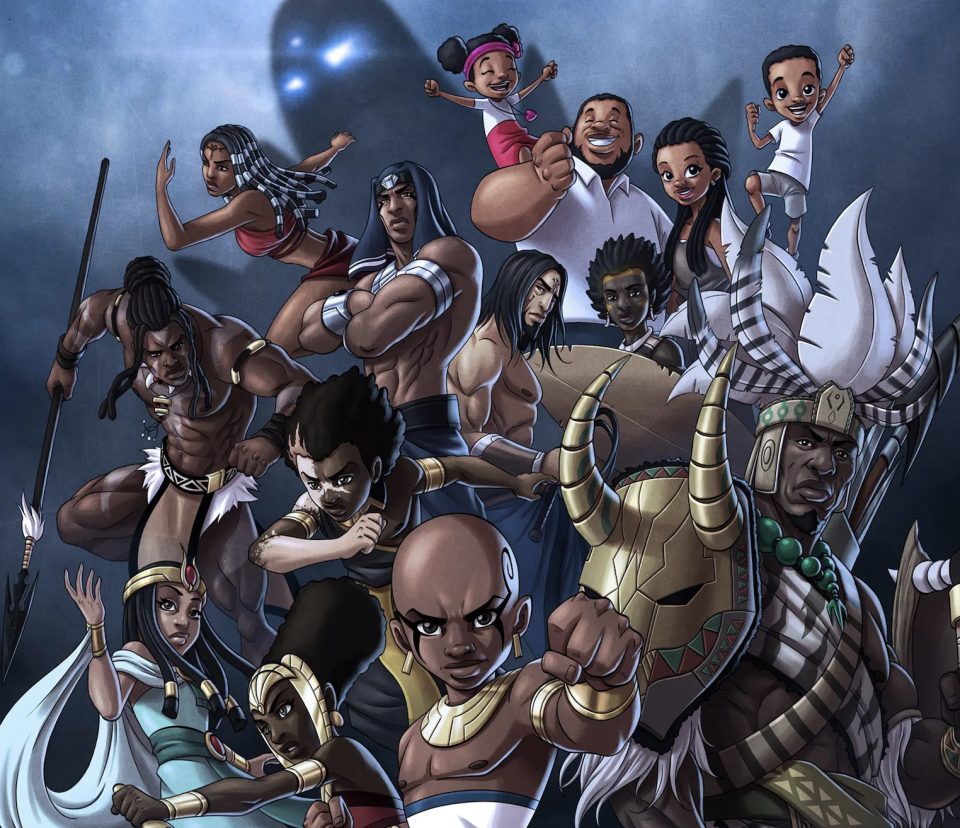
Black History Month is here! Join us from Feb. 1 to Feb. 28 (or all year round) and support our content celebrating the culture.


